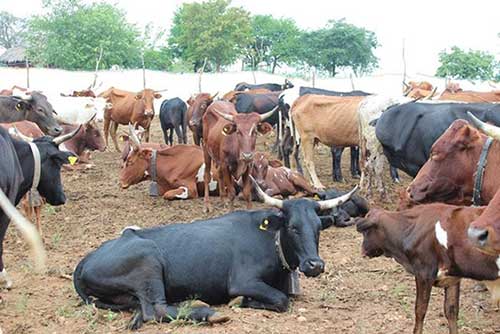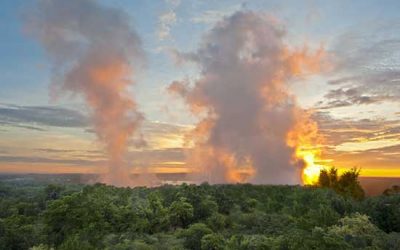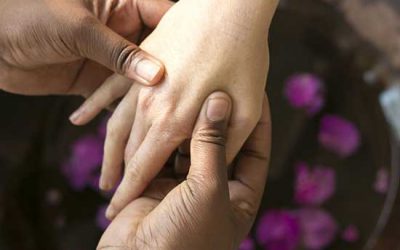Human-wildlife conflict: Predator Protection Part 1
Through a blog series dedicated to the human-wildlife conflict issue, we hope to share some of the ways that the Victoria Falls Wildlife Trust (VFWT) is inspiring change in the region.Introduction
Over a decade ago, a group of passionate conservationists came together with a shared goal- to enhance the conservation status of the beautiful wilderness that envelopes Victoria Falls. Gandhi tells us to be the change we wish to see in the world, and this sentiment took shape in the form of the Victoria Falls Wildlife Trust (VFWT).
Nestled within the Wild Horizons Wildlife Sanctuary near The Elephant Camp, the Trust is now a haven for injured wildlife; a hub of innovation for researchers; and a source of inspiration for all who visit. One of the changes the Trust would like to lead the world towards is a harmonic existence between humans and wildlife. As human settlements continue to expand and encroach on wildlife habitats, instances of human-wildlife conflict (HWC) erupt as an obstacle towards that vision.
Through a blog series dedicated to the human-wildlife conflict issue, we hope to share some of the ways that the Trust is inspiring change in the region.
Investigating the problem
In 2011, the Trust began investigating HWC in the Hwange Rural district communal land that borders Victoria Falls. Over 190 villages have been interviewed to determine the amount of conflict between rural communities and wildlife. The findings were staggering.  In that year alone, over 300 predator conflict incidents were reported, and the qualitative value for the livestock lost amounted to over $91,000. This translates to a devastating economic loss to farmers and their families in these areas.
In that year alone, over 300 predator conflict incidents were reported, and the qualitative value for the livestock lost amounted to over $91,000. This translates to a devastating economic loss to farmers and their families in these areas.
Predator Proof Bomas
The Trust formed a meaningful partnership with the communities afflicted by HWC and together they searched for a solution to the prevailing problem. In 2017, the first predator-proof Boma was installed. A Boma is an enclosure that livestock are put into during the night to protect them from carnivores. The predator proof Bomas are simply constructed from PVC plastic sheeting that is easily moved and can protect up to 250 head of cattle overnight. The Trust has since installed 5 of these mobile Bomas in high carnivore conflict areas in the rural communities surrounding Victoria Falls.
The Results
Two significant results have transpired since the first mobile predator proof Boma was installed. First, predators have killed not a single head of livestock in the Bomas. Second, the cropping yields in some areas where the Bomas were placed have increased by 200%, and most farmers have maintained an increased yield for up to three years after the Bomas were used in their fields.
This not only illustrates how effective alternative methods to handle HWC are, but how their benefits are far reaching into other realms of farming. As human settlements continue to encroach wildlife habitats, we find ourselves at a crossroads, and we need to decide how we want to deal with HWC. We are all guests on this earth, and we need to tread as lightly and respectfully as all other creatures do, recognizing the wilderness as a shared space. The Trust strives to find a solution that brings us closer to a unified world by widening our circle of compassion to embrace all beings as equal entities on earth. Guests staying at The Elephant Camp can visit the Trust to gain a deeper understanding of the grassroots programs they have initiated to protect local communities and the wildlife that share their space. In the second chapter of this series, we will be exploring mitigation strategies the Trust have been experimenting with to deter elephants from destroying crop fields.

Wanderlust & Workouts
Wanderlust & Workouts A holiday is the reward for your body and mind after weeks, months and maybe even years of hard work. The key to healthy and happy holiday is finding a balance between the poolside cocktails/morning pastries, and an exercise regime...
The Elephant Camp – Spa & Gym Addition 2019
The Elephant Camp - 2019 Spa & Gym Addition The Elephant Camp will embark on extensive renovations in 2019, signifying the most substantial enhancement project since its inception. In order to fully execute and expedite the renovation, Main Camp will be closed...
Working to Save Elephant in the Wild
Working to Save Elephant in the Wild We work to preserve and protect both orphaned elephants and those in the wild. Several projects, in collaboration with the Victoria Falls Wildlife Trust, are underway to protect elephant in the Wild. A few of our projects include:-...
Contact Us
Telephone: +263 83 28 42279, +263 83 28 44426, +263 83 28 42001,
Mobile: +263 782 745111
Email: wilma@wildhorizons.co.za
CONNECT WITH US





 Flights between Victoria Falls and Cape Town
Flights between Victoria Falls and Cape Town
